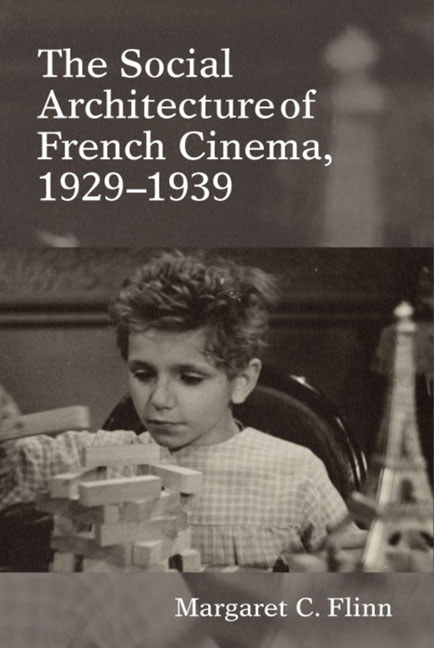Book contents
- Frontmatter
- Contents
- List of Illustrations
- Acknowledgements
- Introduction: An Architecture of Social Being
- 1 The Spatial Constitution of 1930s Documentary
- 2 René Clair's City Views: Realism and Studio Paris
- 3 Intertext and Political Margins in Jean Renoir's Boudu sauvé des eaux
- 4 Traversing Built History in Architectural Documentaries
- 5 Flâneuses and the Unmaking of Place
- 6 The Crowd as New Monumentality during the Popular Front
- Epilogue: Poetic Realism as Spatial Fable
- Notes
- Bibliography
- Filmography
- Index
1 - The Spatial Constitution of 1930s Documentary
- Frontmatter
- Contents
- List of Illustrations
- Acknowledgements
- Introduction: An Architecture of Social Being
- 1 The Spatial Constitution of 1930s Documentary
- 2 René Clair's City Views: Realism and Studio Paris
- 3 Intertext and Political Margins in Jean Renoir's Boudu sauvé des eaux
- 4 Traversing Built History in Architectural Documentaries
- 5 Flâneuses and the Unmaking of Place
- 6 The Crowd as New Monumentality during the Popular Front
- Epilogue: Poetic Realism as Spatial Fable
- Notes
- Bibliography
- Filmography
- Index
Summary
In 1933, Félix Mesguich published Tours de Manivelle: souvenirs d'un chasseur d'images, a memoir of his experiences as a globetrotting cameraman in the first years of the century. Besides being published by the young, but already august, house of Grasset (editor of Marcel Proust, Jean Cocteau, Raymond Radiguet, Blaise Cendrars, and André Malraux, to name but a few), the memoir was extensively excerpted for a three-part feature in the film industry trade paper Le Courrier cinématographique, and was graced with a preface by Mesguich's first employer, Louis Lumière, “Member of the Institute, Commander of the Legion of Honor, Inventor of the Cinematograph.” A single anecdocte from Tours de Manivelle, Mesguich's description of filming a bear hunt in the Russian wilderness of 1905, reveals many of the salient characteristics of early twentieth-century documentary: an exotic location (and the education cum entertainment of the French public about that location and activities undertaken there), real or perceived danger, urgency, and a relative comfort with the mixing of staged footage with “unadulterated” documentary images captured directly from life.
[While the hunters were getting ready,] I had all the boughs that might block the camera's field cut away. In the center of this improvised clearing, I watched attentively for the wild bear's arrival, my hand ready to crank. […]
Finally, a clamor arose: the beaters, hatchets in hand, appearing from all over, making wild cries, to which were mixed the voice of a small dog. He was the one who had caught the animal's scent and awakened it.
Preceded by a formidable growling, in a crash of broken branches, the enormous, furious bear appeared, with its long fur standing on end. […] As soon as it realized it was cornered, the bear turned to face its attackers. Within seconds, it rushed at the lead hunter, who fired. Hit by double barrels, the beast collapsed and didn't seem to show any more signs of life. I approached, up to my knees in snow. Suddenly the wounded animal, gathering what was left of its strength, reared up on its hindquarters. Its gaping mouth red with blood, it let loose a terrible roar and got ready to spring.
- Type
- Chapter
- Information
- The Social Architecture of French Cinema1929–1939, pp. 17 - 38Publisher: Liverpool University PressPrint publication year: 2014



